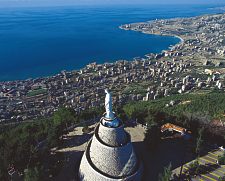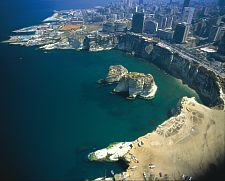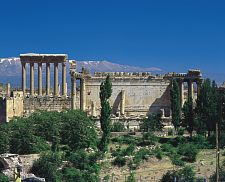|





| |
2 Key Americans See 1982 in Lebanon '06
By CHARLES J. HANLEY
The Associated Press
Sunday, July 23, 2006; 11:57 AM Source:
The Washington Post
-- In Beirut and Tel Aviv, the two American ambassadors watched the war unfold:
Israel's pilots hammering Lebanon, its tanks smashing across the line, its
leaders bent on neutralizing an Arab guerrilla threat to the north.
That was long ago. But Samuel L. Lewis, watching today's war escalate on TV
screens, hears echoes from that summer of 1982.
"I suspect what we're going to see is going to look increasingly like what
happened in '82," says the retired diplomat, U.S. envoy to Israel in 1977-85.
His counterpart in Lebanon during those trying days, Robert S. Dillon, sees a
clear historical parallel in Israel's intent, then and now _ "the idea that you
can, with force, establish a favorable situation for yourself in Lebanon. I
doubt that's true."
Israel's 1982 invasion of Lebanon did succeed in scattering the Palestine
Liberation Organization _ its leaders, its rank-and-file, its guns _ to distant
corners of the Arab world.
But along the way Israel's occupation spawned a new Lebanese enemy, Hezbollah,
and it's these Shiite Muslim militants who are being targeted in Israel's
current offensive.
"That's how it's been throughout Israel's history," Lewis told The Associated
Press. "Things settle down for a while, and then the problem re-emerges in a
more threatening form."
Dillon said Lebanon's foreign minister at the time, Elie Salem, seemed to
foretell 2006 a generation ago as the Shiites of the Lebanese south, rid of the
PLO, asserted their own power.
"Salem told me, `The Israelis have let the Shia genie out of the bottle and will
live to regret it,'" Dillon recalled.
The ambassador personally felt the pain of that emerging power. He was among the
wounded when his Beirut embassy was destroyed by a truck bomb in 1983, an attack
that killed 63 people, 17 of them Americans, and was blamed on the
Iranian-supported Hezbollah.
Not only did a new adversary rise up on Israel's northern border in the 1980s,
but eventually Palestinian terrorism arose anew in a bloodier, suicidal form in
the Israeli-occupied territories.
Looking back, Dillon said, "I'm sure lots of Israelis don't think the 1982
operation was worth it."
There are clear contrasts between the 1982 and 2006 offensives.
Back then, the Israelis clashed not only with PLO forces but also with Syria's
occupation troops in Lebanon, and Israel had fighting allies among Lebanon's
Christians. That doesn't hold today. In 1982 it was a long-planned "war of
choice," launched by Israel without immediate provocation, while the current
offensive was prompted by Hezbollah's cross-border killing and seizure of
Israeli troops.
The starkest contrast, however, lies in the extent and ferocity of the Israeli
attack. By this point in 1982, Lebanese police estimated 10,000 people had been
killed in Israel's air and ground assaults, compared with official tolls today
of at least 380 Lebanese and 36 Israelis. And Israeli armored columns reached
all the way to Beirut in 1982.
Few expect such a long-range Israeli ground thrust this time, but Lewis pointed
to the scenes this weekend of Israeli armor massing at the border.
"It's clear the Israeli high command was optimistic about how well they would
destroy Hezbollah stores of rockets and strongpoints by air strikes," he said.
That optimism was misplaced, he said, and a wider ground operation is probably
imminent to clear Hezbollah from south Lebanon.
"Nineteen eighty-two and 2006 _ they're beginning to look a little more alike."
"It's a very risky operation Israel is embarking on," said Dillon, who after
Beirut served as deputy chief of the U.N. agency for Palestinian refugees.
"The risk is simply of further alienating parts of the Arab world," he said. "In
the end, they somehow _ they've got to live with the Arabs."
Lewis, who rose to become State Department policy planning chief in the 1990s,
questions whether the Israelis can succeed even to the extent they did 24
summers ago.
"The whole idea the Israelis seem to have that they can crush Hezbollah once and
for all is a highly unlikely objective," he said.
But if Hezbollah somehow is disarmed, wouldn't that prove a long-term boon for
Israel?
"I don't know if there are any long-term successes in the Middle East," Lewis
replied. "But particularly for Israel."
|